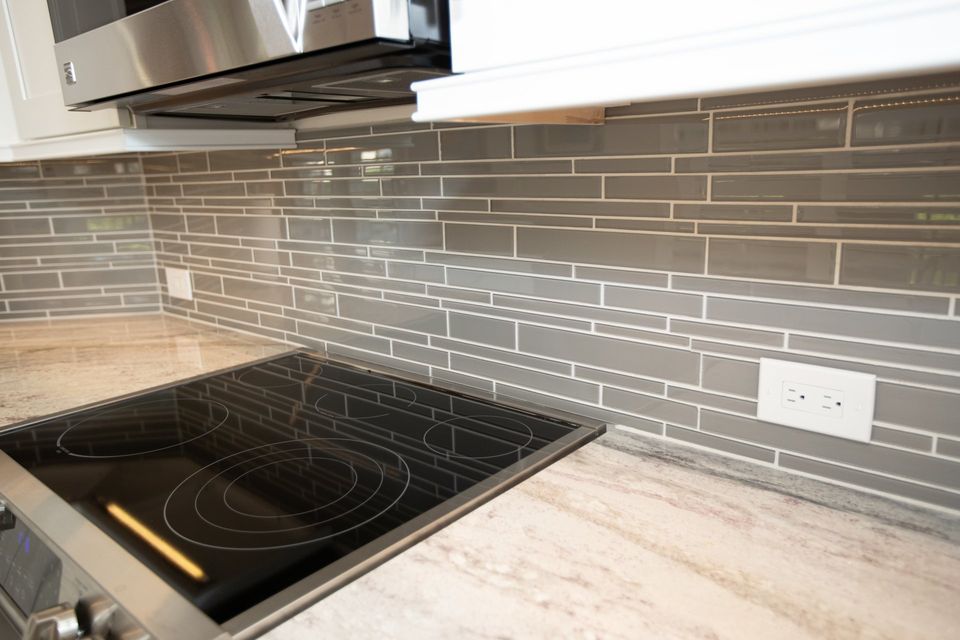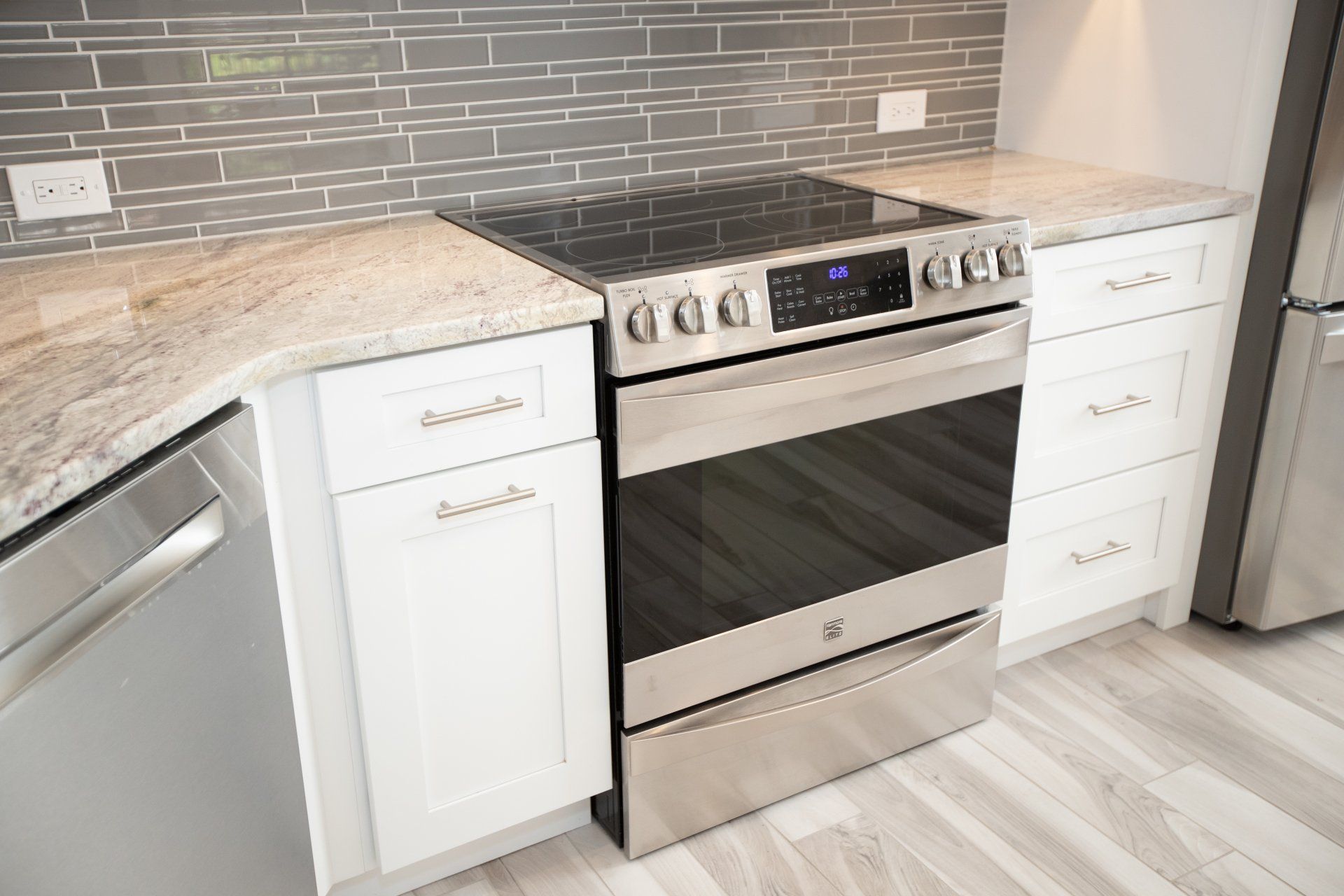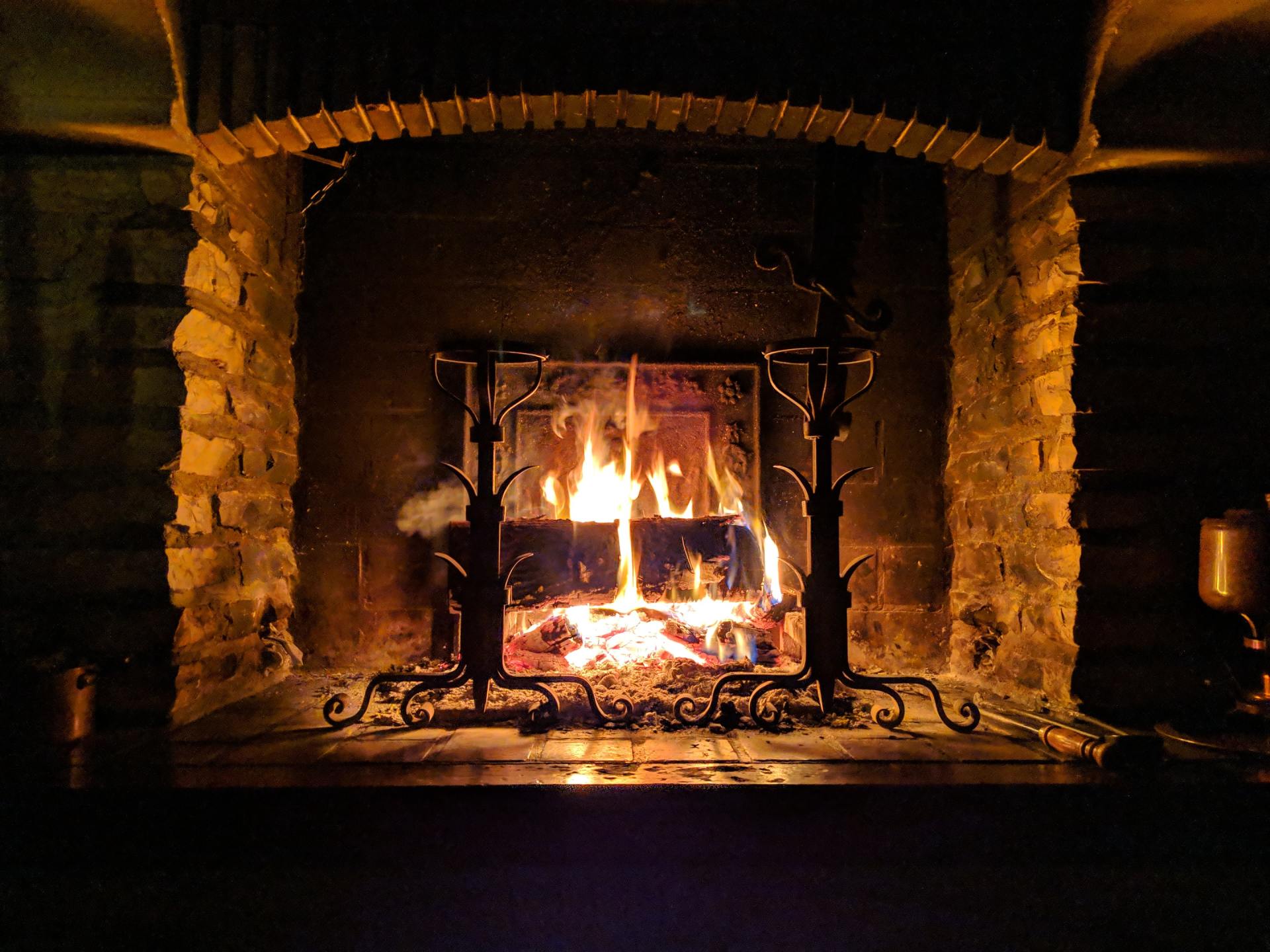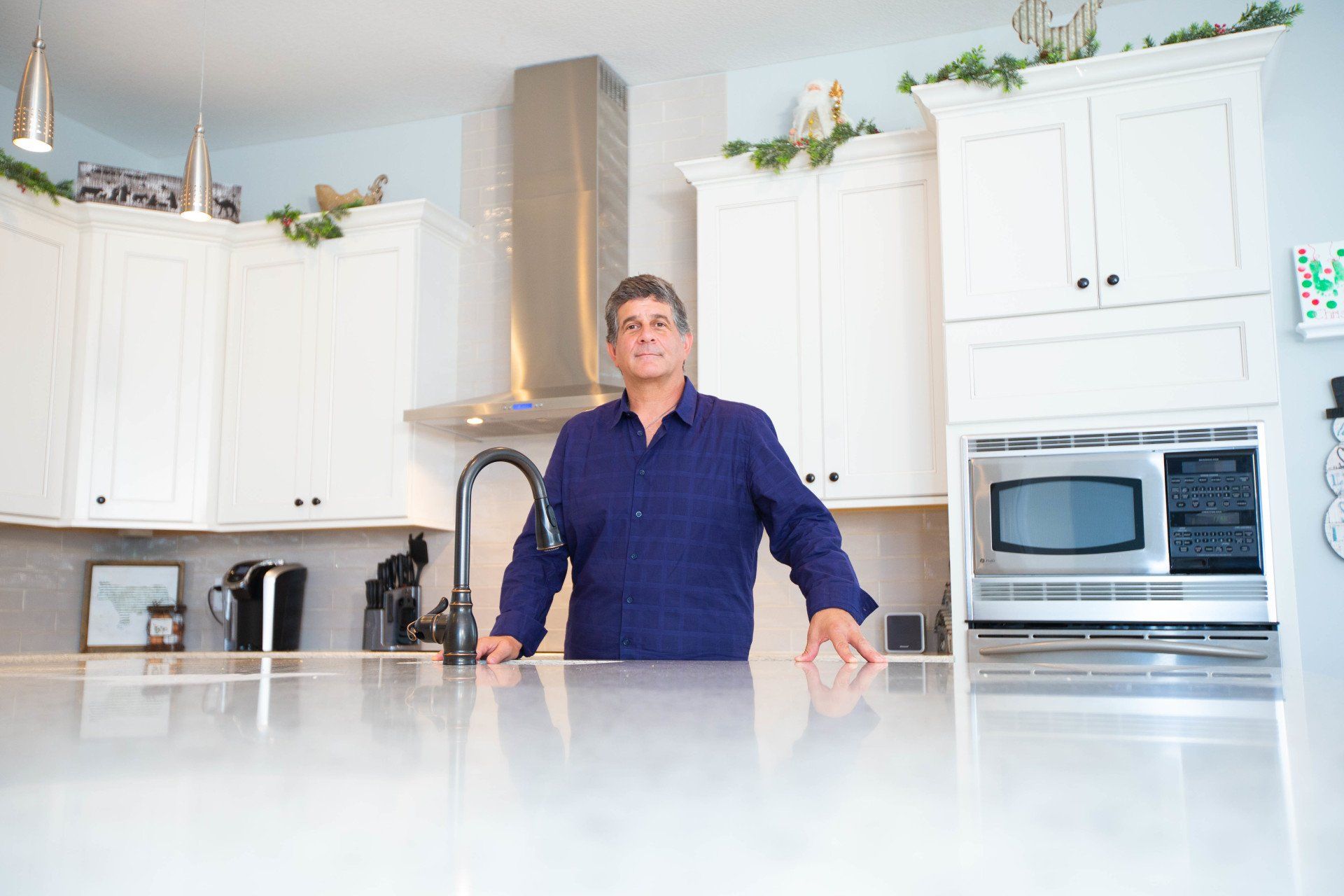Blog Layout
Choosing the Right Backsplash to Compliment Your Countertops
Demetri Skopos • April 9, 2020

As a society, we seem to be spending a lot of time in our houses recently and maybe it has you thinking of doing a little home remodeling. If you are anything like most families, a lot of time is spent socializing in the kitchen. Maybe standing there looking around you have thought, “This kitchen could use an extra something.” Often overlooked in home designs is the kitchen backsplash, which not only gives your kitchen that pop of color/design/personality but also helps to protect your kitchen as well.
Originally designed to help protect the vertical surfaces of the kitchen, a backsplashes purpose helps to shield from stains, spills and splatters as well as help to prevent buildup of mold and mildew. Backsplashes are easy to clean as most are designed to help reduce the hours of scrubbing down walls. Most materials used for backsplashes are designed to be simply wiped down with a damp cloth or sponge. Added bonus! A backsplash can also help to prevent unwanted kitchen visitors such as insects and small rodents looking for a midnight snack.
A backsplash is a perfect way to help give your kitchen a little something extra. A pop of color to an all-white counter and cabinet selection, a simple design to break up darker colors, maybe even a tile selection to help give your space the finishing touch to looking like it belongs in a Tuscan villa. Whatever the reason is for adding a backsplash to your Orlando kitchen remodel, Arete Lifestyles can help.
To help with choosing which backsplash would work best for complimenting your kitchen, here are some tips to follow.
• Consider your overall design as well as the finer details. Choosing a backsplash can be a lot of fun, but remember to take in to consideration such things as lighting, cabinets and most importantly the countertops. Backsplashes closest friends are the countertops since they are the two elements of the kitchen that will be right next to each other with the most space (sorry Mr. Oven). Making sure the counters and backsplash complement each other will better help to showcase them if done correctly.
• Take the time to really consider your options. This is a major change (although it may seem small) that you are going to be living with for a while. Make sure to consider a few options. If need be take some sample tiles home to place in the kitchen. Watch over them the next few days to see how they interact with lighting throughout the course of the day. Make sure they look good next to your cabinets, counters and appliances.
• Have a budget in mind. If you are willing to spend whatever it costs to apply a trendy, state-of-the-art backsplash, then by all means go crazy. However, if your purse strings are a little tight, shop around for deals at different stores. Make sure to know the size of your space as well as this can also help with budgeting. The areas above the sink and oven are the most common for backsplashes.
New Paragraph
Share
Tweet
Share
Mail

By Demetri Skopos
•
February 1, 2021
When it comes to homeowners choosing between the types of stove their dream kitchen would host, they have two options: gas or electric? Traditionally, the type of stove really can boil down to how one learned to cook. If you grew up cooking on a gas stove, for instance, chances are that is what you are going to want in your home. However, that is not always the case. There are numerous amounts of people who find themselves wanting to change their alliance. Whether you find yourself wanting a change to your cooking style because you have found open flame provides a versatile heating experience, or you are parents to young children who have started to explore, and want a safer appliance. You may be in the market for a replacement and are looking to see if a switch might help you from recently burning your dinners, overcooking your roasts or scorching that stir fry you just tried making, we want to help you choose the right stovetop for you. Gas As only natural, gas stoves do require a gas line in order to operate. More often than not, these stoves will run on natural gas that can be hooked up through city gas lines. Depending on your location, some gas lines may not be available in more rural homesteads, whereas the suburbs are usually integrated with both gas and electric powered options. Gas stoves are also able to run off of propane, butane, and even liquefied petroleum gas. They do run a little cheaper than their electric counterparts, it is not by much. Average gas stove prices can range from $460-$2,300, whereas electric stoves range from $450-$2,800. However, the upfront cost is only a fraction of the overall price tag. Operating costs also can help play a factor. In most states, natural gas costs less than electricity. Gas stoves are more precise in its cooking as they have a quicker reaction time to heating food, spreading instantly to the bottom of the pan from the turn of a knob, whereas electric stoves have a slower startup. They can also simply do things that an electric stove cannot such as toasting, charring, and flambéing. These things are more important to the committed home chefs. Gas stoves, while saving money on operating costs, do tend to waste more energy than electric stoves. Electric Electric stoves tend to popular among families as they are safer, as there is no open flame that little hands or rouge dishcloths can accidently find. Electric stoves do not eliminate the risk of fires, but they chances are less likely. They also do not have the risk of a gas leak that natural gas can cause. Electric stovetops are much easier to clean when glass or ceramic, and most newer models have this option. Some electric stoves still use electric coils which are similar to gas stoves burners and grates. Most times an easy wipe down with a damp cloth will be the majority of your cleanups after dinner. Ultimately, your Orlando kitchen remodeling for stoves comes down to how comfortable you are and what you feel safe using.

By Demetri Skopos
•
December 31, 2020
When one thinks of fireplaces, typically we envision a rustic lodge or quaint farmhouse shrouded in cold snowy nights, and room filled with the light from the fire and the feeling of coziness in the air. More specifically one does NOT envision Florida. However, with these chilly winter months settling upon us, us Floridians cannot help to think of the same ambiance of a comfy room filled with the warmth radiating from the fire. Fireplaces of today have become more than the practical source of heat that it once used to be relied on. For this reason, many more people that are having homes built are opting to add them to their perfect dream home. A fireplace addition can help to add character, beauty and even a touch of drama to the space, along with adding an extra value to the house. There are different types of fireplaces in which to choose from for your Orlando home remodeling . Today we are going to dive into the pros and cons of each type to help narrow down your tough decision. Wood Burning Fireplaces The oldest and most traditional of all fireplaces is the wood burning fireplaces. Reasons that these are often chosen is because of their authentic feel and look. Not to mention heady scent of burning wood and the relaxing sound of it crackling in the grate. However, these fireplaces can have some cons. Wood burning means that wood is going to be needed, whether by chopping it yourself of buying and storing it. Making sure to use seasoned wood and not green as that tends to create more smoke and soot. Speaking of soot, wood burning fireplaces need more maintenance especially the chimney. The chimney should be regularly be cleaned and thoroughly swept at least once a year. While a homeowner can certainly do this alone, it is best practice to hire a professional to attend to it as they are also able to check for cracks, deformities or other damages that may have occurred throughout the year. Naturally, the more a fireplace is used, the more buildup of soot and other debris which can potentially lead to catching a “chimney fire”. Furthermore, wood burning fireplaces can lead to heat loss as 80-90% of heat that is produced by the fire seems to escape through the chimney. Gas Fireplaces Gas fireplaces have become increasingly popular as they have all the quaint charm that their cousins the wood burning fireplaces offer, but come with the added benefit of less maintenance. They burn off of propane or natural gas as opposed to wood and produce much more heat. Getting a fire started is so much easier with a gas fireplace, with just the simple flip of a switch or push of a button. Gas fireplaces come in three different variations, the B vent, the direct vent, and the vent less. Electric Fireplaces Electric fireplaces are a perfect décor item for anyone who is looking for the aesthetic of a fireplace without the added benefits of heat, fire wood storage, or the permanence. These fireplaces use a light technology that helps create the appearance of a fire without the fire itself. Coming in many various styles and sizes, they can be a perfect addition to any room for an instant facelift, providing the room has an electrical outlet. Electric fireplaces are low in cost if you are trying to keep your budget low, and do not require an outlet for venting or a chimney.

By Demetri Skopos
•
December 6, 2020
Any home remodeling project can be an exciting and fun experience, however, many people do not realize the mess, dust, and chaos that can come with these improvements. While the mess may be a little bit more expected, having toxic indoor air might not be what your family had in mind. During any simple or major home project, clean air is important and something to concern yourself with. While you may be ready to say goodbye to that old outdated kitchen, making sure your family is safe during the construction time should be a top priority. Why such a big deal? During construction, there are tiny, almost invisible particles that spread from debris, toxic chemicals and even construction materials such as glue, paint and other VOCs (volatile organic compounds). These particles can severely affect the indoor air quality of your home and in turn put you, or your family’s health at risk. If possible, relocating your family while work is being done is best, otherwise take precautions to ensure proper safety. When looking for you Orlando home remodeling company, it is important to ask about how they control their work and air during construction. Inhaling toxic air can lead to respiratory complications such as asthma, cough and allergies. Managing proper indoor air quality is really quite simple. The first and possibly most important aspect is containment. Closing off the section of the house that is going to undergoing construction will help to keep dirt and dust limited to the rest of the house. This can be done by installing plastic barriers or tarps around all openings, such as doors, hallways and windows. Technology has come a long way and is amazing today as many tools and equipment used for remodeling can now help clean the air. One of these such tools in an air scrubber. An air scrubber is an indoor portable air filtration system. Used mainly by contractors and home builders, but can also be used mold remediation specialists. These commercial-grade air scrubbers will fit into a standard home HVAC system then installed directly into the air duct. Arete Lifestyles is dedicated to keeping the air quality in your home as clean as possible during remodeling and clean-up with the use of air scrubbers and more. In addition to air scrubbers, diffusers, humidifiers and air purifiers can also be run throughout construction to help maintain a healthy environment for you and your family. By conducting a daily clean up routine, it can help to reduce the dirt and dust particles in other areas of the home that may have floated in from the remodeling zone. Sometimes remodeling cane take days to complete, sometimes even months. If you and your family are continuing to live among the remodeling, a daily cleanup can help to minimize pollutants. Make sure when hiring a contractor you ask about their cleanup plan to help minimize the contaminants. Once again, remodeling projects can be a fun adventure, but proper care for your family’s health and safety should always come first. If you are looking to remodel your home, call Arete Lifestyles and let us help you get the home you always dreamed of.

By Demetri Skopos
•
October 31, 2020
The holidays are coming up, so you know what that means. Yup, in-laws and relatives are going to be visiting. When trying to impress them with a full on display of “Clark Griswold Christmas Cheer” the best way to make those 6,250 twinkle lights shine is to make sure they are on an equally shiny house! Have you looked at the outside of your house lately? Looking a bit grimy from all those summer rains? It may be time to get your home a bath. You may have heard about power washing in one of its many types (power, pressure, and soft). There are differences between the three. Power washing uses a heavy duty machine to blast away debris and dirt with high pressurized hot water. This form is wonderful for cleaning up heavy soiled concrete, driveways/ sidewalks, stone, and other hard surfaces. Pressure washing is almost the same as power washing, however, it uses cold water instead of hot. This method works really well on cleaning patios, decks, and outdoor furniture. The last form of washing is soft washing which uses a slightly modified pressure washer that allows soap to pass through along with a very low pressure of water. This method relies heavily on the soap to wash off dirt and debris from surfaces that are not strong enough for high pressure such as painted wood, stucco, vinyl siding, and brick. So when is the perfect time to wash your home? Ideally, you are going to want to do it when it is not raining (no, rain water will not help wash your home) and on a sunny, mild tempered day. Having the sun to help soak up the extra water does not hurt either. Many people choose to wash their homes at the end of each season, cleaning away the grim in preparation for the next season. Perhaps you have been neglecting the outside of your home (it has been hot outside, we understand) and now you are thinking of a small Orlando home remodeling project to brighten up the place before the holiday season. How often you should wash your house can depend on multiple factors including -If you live near dirt roads? During the dry seasons, dirt kicked up by passing traffic lands on your property. -Is your home located near a forest or lots of trees? Sap build up, leaf debris, even bird droppings from overhanding tree limbs can cause your home to look grimy. -Has a big storm recently gone through your area? Again, rain water is not what is ideal to wash your home. It contains dirt and other debris which over time creates a dingy appearance. Many of these factors can contribute to your home needing a washing sooner rather than later. If you are unsure if you need a good power wash by simply looking at your home, run your finger along the outside of your home and if a lot of dirt is present it may be time for a wash. If you are still unsure, let the team at Artete Lifestyles consult and provide an estimate for any of your pressure washing needs.

By Demetri Skopos
•
October 1, 2020
Who would have thought that at the beginning of 2020 we would have gotten to this point? I’m talking about your DIY project you thought you could accomplished from being forced to stay inside. Your wife told you not to, but you did not want to listen. You thought it would spruce up the house, maybe get a little more money for when you try to resale, because let’s face it, if one more thing happens this year you plan on packing everything up and moving to Reykjavik. Home renovations are a wonderful thing that any homeowner can do to make a house more of a home. Unfortunately, not all projects are for the better, and worse if you try to do them yourselves without proper supervision (AKA Arete Lifestyles). Today we are going to lay out those renovations that can actually hurt your home’s resale value. Swimming pools and hot tubs. When you live in a state that hosts at least 8 months of summer weather, it may seem like a great idea to add an additional way to cool off. However, according to a study, the most a swimming pool can increase a home’s value is at most 7%. The amount of maintenance and expenses it takes to keep a pool may scare off some potential buyers. With overall cost to build a pool and the minor value increase to the home, it may not be worth the effort. Luxury bathroom. An upgraded bathroom can be a great investment to any home, however it is important to not go overboard with the luxury features. It may be nice to have a spa day every day when getting ready for work, but not every home owner feels this way. Fireplaces, chandelier lighting, imported designer tiles, huge whirlpool bathtubs, these features may make you feel like you are living your best life, but for potential buyers, it may seem too lavish or even gaudy. Bathroom additions such as these only recoup perhaps half of the expense when selling a home. Built in aquariums or other personalized décor. Sure, who wouldn’t love to have a huge wall full of water and watch little fishes and sea creatures swimming about? Truthfully, not everyone sees this as a bonus and it can quickly drain on time and money for those who may not have wanted one in the first place- not to mention an eyesore if not properly maintained. Any sort of personalized décor such as bright colored walls or countertops, giant home theater rooms, garages transformed into home gyms, as much as these additions may sound like a great way for YOU to live there, it may not be the ideal home for the next family to inhabit it. Although some of these items may have been all the rage 10 years ago, our team of experts say they can actually harm your chances of getting the most out of your home when it is time to put it on the market. Before jumping into an expensive Orlando home remodeling , make sure to consult with an expert team such as Arete Lifestyles to help you keep a modest but noticeable difference to your home.

By Demetri Skopos
•
September 1, 2020
There is no denying the fact that this year has turned everyone into homebodies. Not that the majority of us have had a choice, but spending so much time at home during this quarantine has most of us thinking that a change is in order and if we can control that change, maybe things will start looking up. Perhaps something that will have you more inspired to wake up and face the new normal of working from home. Maybe there is a project you have been putting off waiting for that perfect rainy day (consider 2020 as one big rainy day). What better way to conclude this year with a positive note and having Arete Lifestyles give your home the perfect remodel it deserves. If there is one thing that we can all agree to with quarantines in place has lead a good majority of us rethinking some things, most important of which is realizing that when you spend so much time at home that you should really ENJOY your home! There was a reason you loved it in the beginning. Let us help you create a magical place that you and your family can fall in love with again. Arete Lifestyles has so many different services to offer! No matter what the size is, the space, or if it is the newest home fashion trend of the season, Arete Lifestyles can create the perfect, unique look and idea you are striving for. Some of our most common remodeling projects include kitchens and bathrooms, however, we specialize in all areas that you call home, both inside and out! No job is too big or too small for our teams. Home remodeling and improvements are our specialty! We have a talented team of experts in plumbing, electrical, flooring and painting which allows us the ability help you achieve the home of your dreams. We are dedicated to making sure your project gets completed as quickly as possible, while ensuring we do so correctly. Our teams are committed to being up to date on codes, guaranteeing top safety for you and your family. When searching for your next Orlando home remodeling projects, make sure to visit us and consult with one of our designers. Let us help you get the perfect home you always wanted. We are dedicated to your happiness and giving you the quality and customer service that Arete Lifestyles provides. Remodeling does not have to include everything being all shiny and new though, it can also mean maintenance and improvements. Older homes are finding errors or deterioration from when the home was originally built making it unsafe for families. Arete Lifestyles can help to fix those issues and to help ensure the safety of your family for years to come. Did you know we have power washers and pressure cleaners? That’s right! We can clean, literally, your house from top to bottom (outside, of course!). So what are you waiting for… 2021? Make this year a great year by trusting your next home project with Arete Lifestyles.

By Demetri Skopos
•
July 10, 2020
Finally getting that remodel you have been dreaming about? Maybe time in the house these past few months has left you feeling like a face lift for the house is just the thing to get you out of your quarantine funk. Perhaps the kitchen could benefit from a lighter back-splash and counter tops to brighten up your day from making all meals at home. Or updating your bathroom to help you relax at the end of a long day. Whatever your reasons to your Orlando home remodeling project, you can rest assured that Arete Lifestyles is there to give you the dream home you always wanted, while protecting your home during the remodeling process. Things are about to get dusty! During your remodeling you will come to find that even if you thought you cleaned… it is still not clean enough. At Arete Lifestyles, we take extra pride in protecting your home during your remodel project. We invest back into our company to make sure that we have the most advanced technology and equipment in protecting your home and assisting with dust control. We make sure to isolate the work area with heavy plastics and heavy duty cardboard. We also have purchased several air scrubbers to help maintain the quality of the air. Our team sets up one if the air scrubbers before the work begins, and another just outside the project area. These machines act the opposite of an air conditioner and help to protect your AC unit from dust. While we make sure to keep things tidy on our end, there are always precautions you can take to make sure your home stays as clean as possible. Before any work begins, make sure to remove anything that is not part of the remodeling such as furniture, clothing, and home décor. This prevents any of these items becoming dusty and/or dirty and also to help reduce the risk of accidents. Whatever heavy furniture you are not able to move, cover with plastic to help preserve the looks and quality of the piece. Keeping dust and debris away from the small cracks and crevices allows the piece to retain its finish. If the project is in a part of the house that is away from an entry, take precautions towards removing loose objects, isolating the area with tarps to help keep dust from entering different areas, and lay down tarps or carpet squares to help reduce dust from being traipsed around the house. Although the contractor should be making sure a daily cleanup is being done at the end of the day, it does not hurt to do a quick sweep up of the areas around the project. This will help to reduce the spread of dust to the rest of the house. If by chance you have hardwood floors or furniture, take the time to vacuum (especially with the soft bristled attachment) over the wood first. This will help in protecting the wood from getting scratched later.

By Demetri Skopos
•
May 11, 2020
“The magic thing about home is that it feels good to leave, and it feels even better to come back.” – Wendy Wunder. That should be true about your home, but what if it’s not? A home is much more than where you go to every night, or what you may be quarantined in for the next few months. It should be your escape from the outside world; a place to feel safe and secure; the place where you and your family love and grow. A home is your happy place. And sometimes happy places need a little TLC too. During this bizarre time the world is in, being at home may have made you look around to notice that some modifications would not be a horrible idea. In fact, the more you think about it, the more exciting the prospect becomes! The idea of remodeling your home can set many ideas of inspiration into motion which can then turn into being overwhelmed with possibilities. From color palette to stoneware, flooring choices to exterior decorating, the concepts can be endless. Instead of getting too far ahead, contacting a professional remodeling agency to assist in your endeavors would be the safest choice. When starting your journey for your Orlando home remodeling , there is no other choice but to reply on Arete Lifestyles to make your house into your perfect dream home. Our team of experts knows what it takes to make a house into a home, and to create that perfect updated beauty needed for your home. Not only do we take the time to listen to what our customers’ needs and wants are, but we are able to provide alternative ideas that may have never been thought of before. We work within the budget of our clients, because we know that times can be tough, but you deserve the home that you always wanted as well. At Arete Lifestyles, we ensure that we get your project completed efficiently and quickly. We understand that a project does not have to last longer than it needs to, and we want our clients to enjoy their new space as soon as possible. Our team strives to make sure that your remodel is done properly and correctly the first time, so we do not have to return and take up more of your precious time. There is a reason our previous clients keep coming back to Arete Lifestyles for their upcoming remodeling projects- it’s because they know we pay attention to the small details, we work with our clients to understand their expectations and the service we provide is unlike anything else you will find in the Orlando area. We love to make dream homes a reality and to see our client’s smiles as they view their new kitchen, bathroom or any remodeled portion of their homes for the first time. Let Arete Lifestyles create that picture perfect dream home that you always wanted.

By Demetri Skopos
•
March 1, 2020
Sometimes in life there is nothing that is more satisfying than watching water remove away years of dirt and grime. Admit it, you have also been caught watching those viral videos of things being cleaned and felt immense pleasure and contentment. These dramatic results can be found also in the form of pressure washing, which if you have fallen into the habit like the majority of property owners, you do not clean outside as often as you should. Do not worry, we are all guilty. When researching professional cleaning companies to come and help eliminate the grim (and again watching layers of dirt being sprayed away by a professional cleaning crew is just as satisfying) you may come across three different types of washing that can result in clean driveways, decks and houses. If you do not know the difference between soft, power and pressure washing, you are not alone. However, you are in luck because we will help you go over those differences in this article. Pressure washing is an effective and again, extremely satisfying, cleaning solution for your home. With pressure washing water is being forced out of a hose/nozzle at a high frequency, with enough power this can eliminate years of dirt and grim. It can also cut to the bone or descale a fish in a split second, so make sure you call a professional pressure washing company to do this chore for you. When pressure washing it is important to take special care when attempting home siding, for instance make sure you are the correct distance away that you do not damage vinyl siding, shingles, etc. This type of wash is best done on walking surfaces such as driveways, stone pathways, decks and can also be applied to patio furniture and hard surfaces that dirt has become embedded in over the years. Power washing is very similar to pressure washing in the fact that it uses the same force of pressure at a high rate to tear away dirt, however, there is a second element thrown in here, hot water! Yes, with great power washing comes great hot water responsibility. The added bonus of hot water creates another ability to breakdown organic substances faster and sanitize as well. Professional power washing tools cannot be bought and acquired to those who are not a professional, nor should they. They are extremely dangerous and should only be used by someone with the know how to do it. Soft washing you may think is just more along the lines of a garden hose spraying down some flowers, however, that is far from the case. They are still in fact a pressure washing machine, simply the top of the nozzle has been replaced to lower the PSI (pressure per square inch) which widens the spray but drops the point of pressure from the hose. The force may not be the same, but a cleaning solution is added to the water which breaks down grim, dirt and organisms clinging to surfaces. These solutions are eco-friendly and will not damage or strip any protective or finished coatings on your surfaces. When trying to find a professional pressure washing company to undergo your Orlando home remodeling needs, make sure to consult with Arete Lifestyles for your washing satisfaction.

By Demetri Skopos
•
February 1, 2020
Not every house is perfect, but to you it should feel like it is. Home is where the heart is after all. If you have been asking should I remodel or just find a new place, chances are there is something there that you do not completely love. Asking this question is a good thing, however, because it allows you to narrow down on what it is that you may need and get down to the real questions such as: Is it in my budget to remodel? Does it make sense just to move to a bigger place? What is more of a hassle? E veryone’s living situation, budget and home priorities are going to be different. With markets fluctuating between buyers or sellers, sometimes it makes more sense to do one over the other. There are a few factors that can help someone determine whether or not remodeling your current space is ideal, or packing up and moving to a new neighborhood. The number one factor that plays into the fray is money. What is going to be more cost effective for your budget? One thing to remember is that there are some hidden costs that can be attached onto buying a new home such as closing costs, real estate agent commissions, moving costs and in the long run if you are moving into a larger home it takes money to heat/cool a larger space. Those fees are not just in buying a new home, however, there are costs to large scale remodeling as well including: labor and material, permits, financing and interest cost can add up as well if you are not paying cash. If something were to happen during the remodeling, such as an unexpected issue, this can also create more of a financial burden. Another factor to help decide is to research your market area. Would it make sense to sell your current home because the market is to your advantage? You may need some minor repairs done to the home first before listing to get a higher asking price. How emotionally attached are you to your home? Is it where your kids grew up or maybe still growing and have friends and their school nearby? If you move will they be able to go to the same school as before? How long is your commute to work? Do you have good neighbors? Moving into a new neighborhood may seem exciting at first, but what if your new neighbors play loud music until 2 AM every other night? What does your timeline look like? Do you need more space right away or can you wait a month or two before a renovation could get done? Can you be flexible with a remodeling schedule or perhaps wait a period of time for your current home to sell first? There are many factors to consider when thinking about your Orlando home remodeling project. Sometimes weighing these pros and cons out can give you a much clearer insight to that classic saying, “There’s no place like home.”
Proudly Serving: Celebration, Golden Oaks, Lake Buena Vista, Dr. Phillips, Windermere, Lake Nona, Melbourne, Melbourne Beach, Viera, Indialantic, Satellite Beach, Winter Park, Heathrow, St Petersburg Beach, Treasure Island, Madeira Beach, Sand Key Beach, and Terra Verde
®Arete Lifestyles // All Rights Reserved | Powered By Bizimage Marketing
